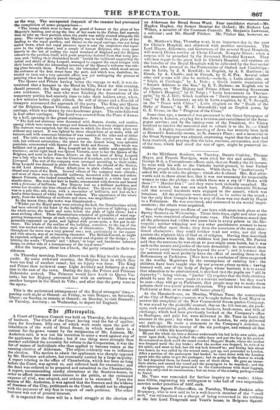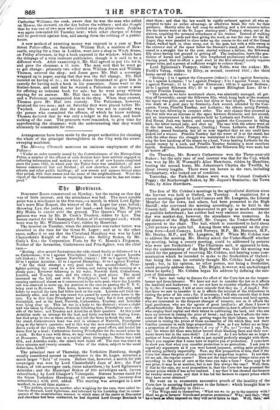b liattropolis.
A Court of Common Council was held on Thursday, for the despatch of business. The Clerk of the Court having read the list of applica- tions for freedoms, fifty-one of which were made upon the part of inhabitants of the ward of Bread Street, in which ward there is a contest for the gown vacant by the resignation of Mr. Lainson, Mr. Anderton said, it was not his intention to utter a word against any of the applicants for the freedom ; but if one thing more strongly than another exhibited the necessity for reform in the Corporation, it was the list of names of individuals who thus applied to become voters at the ensuing election of Alderman. The object evidently was to influence the election. The motion to admit the applicants was sharply opposed by Mr. Harrison and others, but eventually carried by a large majority. A report relating to the office of Chamberlain, which has been so long before the Court, was agreed to, and referred back for execution ; and the deed was ordered to be prepared and submitted to the Chamberlain. A report, recommending sundry alterations at the Sessions-house, in order to afford increased convenience to the public, at the estimated expense of 4701., was adopted, and ordered to be executed. Upon the motion of Mr. Anderton, it was agreed that the freemen and the widows of freemen of the City, petitioners to the Court, should not be charged with the payment of any fees in respect of such petitions. The other business was not of general interest.
It is expected that there will be a hard struggle at the election of an Alderman for Bread Street Ward. Four candidates started—Mr. Hughes Hughes, the former Member for Oxford ; Mr. Richard Lea Wilson, a member of the Common Council; Mr. Benjamin Lawrence, a solicitor ; and Mr. Sheriff Pitcher. Mr. Pitcher has, however, re- tired.
St. Matthew's Day, Thursday next, is an important day in the year for Christ's Hospital, and observed with peculiar ceremonies. The Lord Mayor, Aldermen, and Governors of the several Royal Hospitals, will attend Divine service at Christ Church. Newgate Street ; when a sermon will be preached by the Reverend Nathaniel Keymer. They will then repair to the great hall in Christ's Hospital, and orations on the benefits of the Royal Hospitals will be delivered by the four senior scholars, who proceed to the Universities of Oxford and Cambridge ; one in Latin, by J. S. Benifold ; in English, by A. S. Harrison ; in Greek, by A. Chubb; and in French, by G. B. Pix. Several other odes and poems will also be recited,—namely, a Latin alcaic ode, on "Scipio at Carthage," by L. Dale ; a Greek iambic translation of "Satan's Address to the Sun," by E. T. Hudson ; an English ode to the Queen, on "Her Majesty and Prince Albert becoming Governors of Christ's Hospital," by G. Voigt ; " Latin hexameters on Thermo- pylae," by G. J. Gill ; Greek iambics on "David mourning over Absa- lom," by M. A. Leicester ; an ode in Latin sapphics, by E. T. Scargill, on the " Peace with China " ; Latin elegiacs on the "Death of the Duke of Sasses," by W. F. Greenfield ; and an English poem, by G. E. Evans, on the "Progress of the Cross."
Some time ago, a memorial was presented to the Great Synagogue of the Jews in London, praying for a revision and curtailment of the Syna- gogue service ; and by the casting-vote of the President, the Vestry resolved to receive the memorial and to submit it to the future Chief Rabbi. A highly respectable meeting of Jews has recently been held at Howard's Assembly-rooms, in St. James's Place ; and a memorial to the Great Synagogue was adopted, expressing regret that the other had been received, and praying that the laws, customs, ceremonies, and rites of the race, which had stood the test of ages, might be preserved in- violate.
At the Middlesex Sessions, on Tuesday, Dennis Coakley, Thomas Hayes, and Francis Harrigan, were tried for riot and assault. Mr. George Ball, a Customhouse-officer, said, that on Sunday the 3d instant, he went with his wife to the Catholic burial-ground, to hear Father Mathew preach his farewell sermon. While there, he 'inadvertently" asked his wife to take the pledge ; which she declined. Mrs. Ball after- wards said to those about her, that it was not necessary for respectable women to take the pledge ; on which there was a cry of "Down with them !" " Murder him ! ' and they were both violently assaulted. Mr. Ball was kicked, but was not much hurt. Police-constable Nicholas said that several hundreds were engaged in the assault, which was ferocious. All the prisoners were declared to be active in the attack ; but the only blow brought home to any of them was one dealt by Hayes to a Policeman. He was convicted, and sentenced to six weeks' impri- sonment; the others were acquitted.
One of the frequent conflicts of our laws with sense took place at the Surrey Sessions on Wednesday. Three little boys, eight and nine years of age, were convicted ofstealing some toys. The Chairman stated that all the prisoners had within two years been in every prison in the Me- tropolis; neither whipping nor any other punishment seemed to have the least effect upon them ; they were the associates of the most aban- doned characters ; they could neither read nor write, nor did they possess the slightest idea of God or of religion. Having thus described the education which the little children had just received, Mr. Puckle said that the sentence he was about to pass might seem harsh, but it was such as the nature and justice of the case demanded : he sentenced them to "seven years' transportation beyond the seas "; and it is stated that the sentence will most probably have the effect of sending them to the Reformatory at Parkhurst. [Now here is a confusion of ideas suggested
to the worthy Magistrate by the assumptions of existing law : the
children have been taught vice by our present prison system ; having learned well, one of the body of Judges, whose business it is to cause that education to be administered, is shocked that the pupils are "old in depravity ": being vicious, " justice " (!) requires that the little children should be sent for seven years to a convict settlement: but they won't be sent—they will go to Parkhurst, that people may try to make them unlearn their two-years' prison education. Why not have sent them to Parkhurst at first, or to some still better place?]
At the Mansionhouse, on Monday, William Tune, the commander of the City of Boulogne steamer, was brought before the Lord Mayor to
answer the complaint of the New Commercial Steam-packet Company. It was stated by the plaintiffs' counsel, that on the 6th instant, six pack- ages, each containing gold, checks on bankers, bank-notes, and bills of exchange, which had been previously booked at the Company's office in Boulogne, and paid for, were delivered to Mr. Tune on board the steamer at the port ; but when he came to London, he only delivered
one package. He made a statement to the Company's solicitor, in which he admitted the receipt of the six packages, and related all that happened within his knowledge— He put the whole six into a drawer underneath his bed in his own cabin, and went upon deck, having locked the cabin-boor and put the key in his pocket.
Be remained on deck until the vessel reached Margate Roads, where the anchor was dropped until the day broke ; after the anchor was dropped, he retired to his cabin, and went to bed, but did not lock himself in; and having lain about
two hours, he was called by the second mate, got up, and proceeded to London. After a portion of the passengers had landed, he went down with the London agent into the cabin to get the packages; but on going to the drawer in which he had deposited them, he found only one of them there. Be gave an imme- diate alarm, and caused the vessel and the passengers to be searched; and the other passengers, who had proceeded to the Customhouse with their luggage, were also subjected to examination ; but no trace of the missing packages could be found.
Mr. Tune was remanded for farther inquiry to be made ; Alder- man Gibbs, expressing his willingness to take bail of two respectable sureties under penalties of 500/. each.
At Queen Square Police-office, on Tuesday, Thomas Jenkins alias Brummey, who is now said to be a well-known member of the "swell mob," was reexamined on a charge of being concerned in the robbery at the late Lord Fitzgerald and Vesei's house, in Belgrave Square. Catherine Williams, the cook, swore that he was the man who Called on Howse, the steward, on the day before the robbery ; and she thought that he was one of two men who carried away the plate-chest. Jenkins was again remanded till Tuesday next ; when other charges of felony will be preferred against him, and among them the robbing of a public- house.
A new method of extorting money was exposed in a case at Bow Street Police-office, on Saturday. William Hall, a resident of New- castle, staying for a time in London, went into a shop in Wych Street, on Friday afternoon, to bay a book exposed in the window, which bore the titlepage of a very indecent publication, though it is said to be a different work. After examining it, Mr. Hall agreed to pay 15s. for it, and gave the shopman a 5/. note. The man said that he must go to get change ; presently two other men, William Jones and William Thomas, entered the shop ; and Jones gave Mr. Hall a sovereign *wrapped up in paper, saying that that was the full change. Mr. Hall insisted on having 4/. 5s.; on which Jones threatened to give him in custody for having such a book in his possession. Jones went to the Station-house, and said that he wanted a Policeman to arrest a man for offering an indecent book for sale ; but he went away without staying for an answer. Mr. Hall then came to the Station-house, and a Policeman accompanied him to the shop. When they entered, Thomas gave Mr. Hall into custody. The Policeman, however, detained the two men ; and on Saturday they were placed before Mr. Twyford. Jones said that the man who was not in custody was the person who committed the offence, of which he knew nothing. Thomas declared that he was only a lodger in the house, and knew nothing of the case. The prisoners were remanded, to give time for apprehending the shopman; with the understanding that they would ultimately be committed for trial.
Arrangements have been made by the proper authorities for cleaning the whole of the principal thoroughfares in the City with the street- sweeping machines.
The Morning Chronicle mentions an ominous employment of the Police- " Under an order recently issued by the Commissioners of the Metropolitan Police, a number of the officers of each division have been actively engaged in collecting information and making out a return of all new houses completed since the years 1830, in which year the Police force was established ; all new houses commenced but not finished • all new churches, new chapel., new schools, and other public buildings ; all new streets and squares formed since that period, with their names and the name of the neighbourhood. What the object of the Commissioners in requiring those returns can be, has not trans- pired."



























 Previous page
Previous page